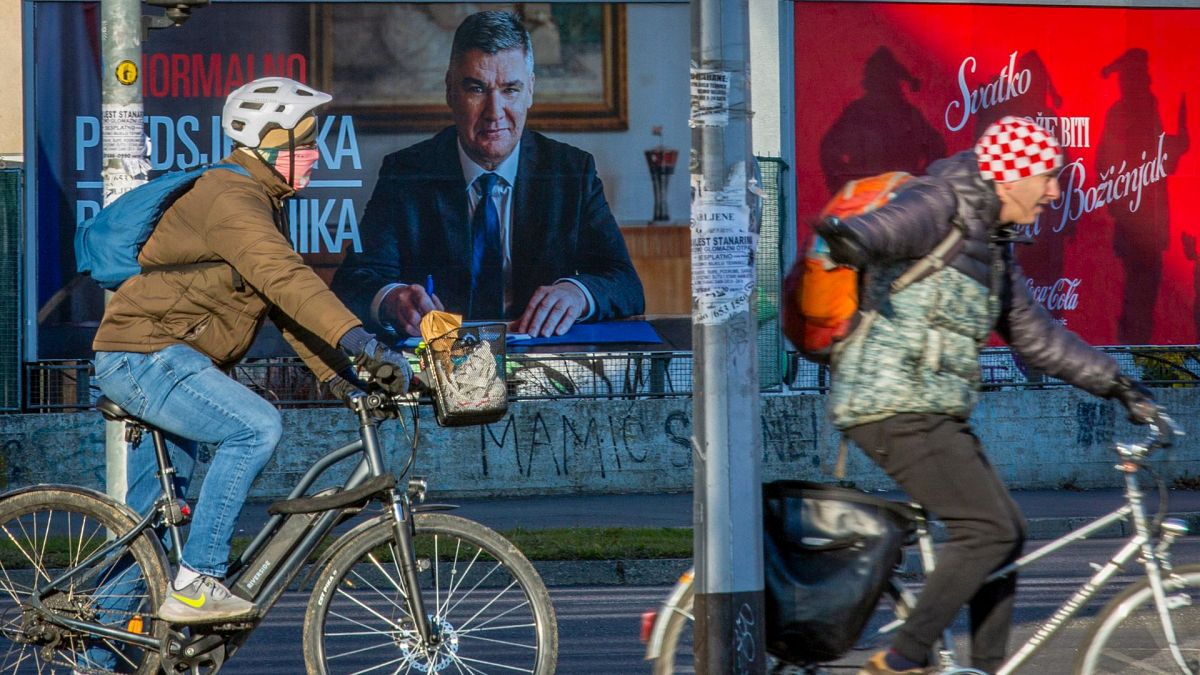The incumbent president, touted as the most popular politician in the Adriatic country, has been widely criticised for his populist views, including his opposition to the EU’s support of Ukraine.
Croatia’s left-leaning president, Zoran Milanović, a vocal critic of Western military support for Ukraine amid the ongoing Russian all-out invasion, is vying for reelection this weekend against a range of contenders, including a candidate backed by the centre-right government.
Milanović, 58, a former prime minister and Croatia’s most popular politician, is considered the frontrunner in Sunday’s election.
However, he is unlikely to secure an outright win. If none of the eight candidates gain over 50% of the vote in the first round, a runoff will be held on 12 January.
Milanović has been an avid critic of centre-right HDZ Prime Minister Andrej Plenković, and their ongoing clashes have become a defining feature of Croatia’s recent political landscape.
In turn, the HDZ has endorsed paediatrician and university professor Dragan Primorac for the presidency.
Primorac has positioned himself as a unifier, contrasting his campaign with Milanović’s often polarising rhetoric.
Although the Croatian presidency is seen as mainly ceremonial, the role carries political authority and includes acting as the supreme commander of the military.
Milanović, who saw his popularity spike after embracing populist talking points, has been a persistent critic of the West’s support for Kyiv, advocating for Croatia’s neutrality despite its membership in both NATO and the EU.
He has blocked Croatia’s participation in a NATO-led training mission for Ukraine, stating, “No Croatian soldier will take part in somebody else’s war.”
Primorac has countered by emphasising Croatia’s Western alignment, stating, “Croatia’s place is in the West, not the East.”
However, his campaign has been overshadowed by a high-profile corruption scandal that led to the imprisonment of Croatia’s health minister.
Political expert Anđelko Milardović suggested that Milanović’s reelection could benefit democracy by balancing the ruling party’s dominance over other government institutions. “We are interested to see a balance and control of power,” he said.
However, the incumbent president’s critics have voiced concerns over his propensity for causing a stir with outrageous comments, which could jeopardise Croatia’s success story as the last country to join the EU in 2013, embrace the euro and enter the Schengen area since then — setting it on a path that has so far evaded all former Yugoslav states bar neighbouring Slovenia.
Milanović has the support of the centre-left SDP, Croatia’s largest opposition party.
Who are the key contenders?
Among other contenders is conservative independent Marija Selak Raspudić, who ranks third in pre-election polls.
Formerly affiliated with a far-right conspiracist Most party, Selak Raspudić now runs as a non-partisan candidate, focusing on economic issues, population decline, and corruption.
Fourth is Ivana Kekin of the left-green Možemo party, which governs the country’s capital, Zagreb.
A psychiatrist, Kekin describes herself as a “president for a new generation” and has accused Primorac and HDZ of diverting funds from Croatia’s health system.
Four additional candidates are in the race, but none are expected to advance to the second round.
Croatia has approximately 1.6 million eligible voters among its 3.8 million citizens.
Additional sources • AP
Checkout latest world news below links :
World News || Latest News || U.S. News
The post Croatian presidential election: Milanović faces battle for second term appeared first on WorldNewsEra.

